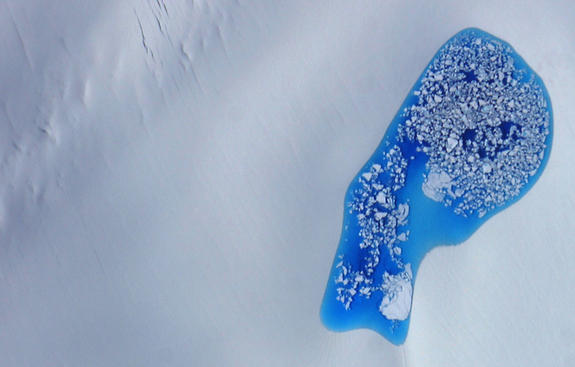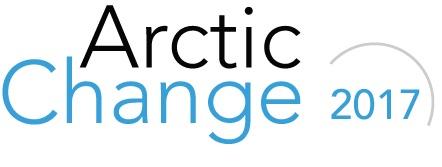|
|
|
|
|
|
|
|
LECTURE... Sandra Starkweather (NOAA, US AON): The US Arctic Observing Network- Mobilizing Interagency Observing Actions in an Ear of Rapid Change, July 21, 2017 (Washington, DC USA). In September 2016, NOAA and other US agencies submitted a deliverable to the White House Arctic Science Ministerial (WHASM) to formally establish and fund the coordination of a US AON initiative. This US AON initiative brings new coordination capabilities on-line to support and strengthen US engagement in sustained and coordinated pan-Arctic observing and data sharing systems that serve societal needs. US AON promotes the vision of well-defined observing networks that enable users to have access to high quality data that will realize pan-Arctic and global value-added services and provide societal benefits. This talk will describe the capabilities of the new US AON initiative and how those capabilities are being mobilized towards both the "backward" and "forward" problems of Arctic observing. Solving the "backward problem" requires drawing existing observations into interoperable, multi-sensor, value-added data products. Solving the "forward problem" requires the alignment of multiple agency needs and capabilities to coordinate and design the network that is "needed". Both approaches have their own unique benefits and constraints which will be explored during this presentation.
|
Media
 Senators Renew Call to Ratify Law of the Sea Treaty to Help Chart Future of the Arctic. Senators Renew Call to Ratify Law of the Sea Treaty to Help Chart Future of the Arctic. Two key senators have renewed a more than 30-year-old United States call to ratify the Law of the Sea Treaty in order to have a seat at the table involving the Arctic's future. Sen. Lisa Murkowski (R-Alaska), chair of the Senate Energy and Natural Resources Committee, said Wednesday by not ratifying the 1982 United Nations Convention on the Law of the Sea the United States is locked out of international enforcement of what it considers its outer continental shelf for possible development and protection, the seabed and fisheries. Sen. Angus King (I-Maine), also a member of the committee, called the Senate's failure to ratify the pact "a huge self-inflicted wound," speaking Wednesday at the Center for International and Strategic Studies. The failure to ratify based on arguments of loss of American sovereignty if approved means "right now we're not in the game" in deciding broad maritime issues. USNI News
Wreck of Fishing Boat That Sank in Bering Sea Found by NOAA Searchers.The wreckage of the fishing vessel Destination, which sank in the Bering Sea in February, has been found, the U.S. Coast Guard said Thursday. A National Oceanic and Atmospheric Administration research vessel found the wreckage earlier this month, northwest of St. George Island, in about 250 feet of water, the Coast Guard said. Alaska Dispatch News
Battering Rams of the Arctic: Icebreakers, Explained. When ice floes stretch to the horizon in the Arctic Circle, threatening to strand normal ships, icebreakers are in their element. For big vessels, they can turn quickly to avoid big blocks of ice, and can stop fast. They can slice through many ice fields without a shudder. And when the going gets rough, they can push their mighty bow on top of the ice and bust it up through the sheer force of the ship's weight. Icebreakers, like the one transporting Associated Press reporters and international researchers through the Northwest Passage, are the battering rams of far northern climes. US News
 Mountain Glaciers Recharge Vital Aquifers. Mountain Glaciers Recharge Vital Aquifers. Small mountain glaciers play a big role in recharging vital aquifers and in keeping rivers flowing during the winter, according to a new study published in Geophysical Research Letters, a journal of the American Geophysical Union. The study also suggests that the accelerated melting of mountain glaciers in recent decades may explain a phenomenon that has long puzzled scientists-why Arctic and sub-Arctic rivers have increased their water flow during the winter even without a correlative increase in rain or snowfall. Phys.org
How Much Does Inuit Art Contribute to the Canadian Economy. A recent report lays out in detail, just how much the Inuit arts economy contributes to the North, and to Canada as a whole. In 2015 alone, the Inuit art economy contributed $87.2 million to Canada's GDP, according to Impact of the Inuit Arts Economy, commissioned by the federal government and released this month. "In the less than 70 years since the commercialization of Inuit art began, the production of Inuit arts and crafts has spread across Inuit Nunangat and outside Inuit Nunangat and has found an enthusiastic market across Canada and around the world," it said. Radio Canada International
|
|
Future Events
As the Symposium is organized jointly by two leading Research Institutes of Russian Academy of Science - Institute of Water Problems and Melnikov Permafrost Institute, particularly the contributions on following research topics are welcome:
- Observational evidences of change in coupled permafrost-hydrology system.
- Present state and future projections of local, regional and pan-Arctic hydrology.
- Modeling studies representing landscape evolution, dynamics of water storages and permafrost degradation.
- Impacts of permafrost hydrology changes on local communities.
VII International Conference on Cryopedology, August 21-25, 2017 (Yaktsk, Russia). The conference will be hosted by the Institute for Biological Problems of the Cryolithozone of the Siberian Branch of the Russian Academy of Sciences (SB RAS). Plenary reports will be organized in the hall of the Academy of Sciences of the Sakha (Yakutia) Republic. The official languages of the conference are English and Russian (with translation). All technical facilities (projectors, computers, video sets) will be available during the conference for presentation of papers. Additional information will be available soon. See the Facebook page here.
 2017 University of the Arctic Rectors' Forum and Conference, August 27-29, 2017 (Aberdeen, Scotland). This conference will also consider how northern scholarship can add to discussions on the North into broader terrains of intellectual engagement. In so doing, it will challenge dominant paradigms of research in both the natural and the social sciences, above all by calling into question the very separation of the world of nature from that of human society which underwrites the distinction between these two branches of scientific inquiry. In its place the conference will seek to forge a new practice of interdisciplinary research, done in collaboration with northern residents and on their terms, which recognizes that every discipline is itself an ongoing conversation, or a way of knowing, rather than a compartment within an overarching, hierarchically organized system of knowledge. Conversations from the North will, then, help to generate a science that is more open-ended, responsive to environmental variation and respectful of the wisdom of inhabitants. 2017 University of the Arctic Rectors' Forum and Conference, August 27-29, 2017 (Aberdeen, Scotland). This conference will also consider how northern scholarship can add to discussions on the North into broader terrains of intellectual engagement. In so doing, it will challenge dominant paradigms of research in both the natural and the social sciences, above all by calling into question the very separation of the world of nature from that of human society which underwrites the distinction between these two branches of scientific inquiry. In its place the conference will seek to forge a new practice of interdisciplinary research, done in collaboration with northern residents and on their terms, which recognizes that every discipline is itself an ongoing conversation, or a way of knowing, rather than a compartment within an overarching, hierarchically organized system of knowledge. Conversations from the North will, then, help to generate a science that is more open-ended, responsive to environmental variation and respectful of the wisdom of inhabitants.
- Small and off-grid community energy solutions
- Oil and gas development
- Renewable energy
- Regulation and Financing
- Transportation and transmission
The AES is a multi-disciplinary event expected to draw several hundred industry officials, scientists, academics, policy makers, energy professionals and community leaders together to collaborate and share leading approaches on Arctic energy issues.
2017 Arctic Circle Assembly, October 13-15, 2017 (Reykjavik, Iceland). The annual Arctic Circle Assembly is the largest annual international gathering on the Arctic, attended by more than 2000 participants from 50 countries. The Assembly is held every October at the Harpa Conference Center and Concert Hall and is attended by heads of states and governments, ministers, members of parliaments, officials, experts, scientists, entrepreneurs, business leaders, indigenous representatives, environmentalists, students, activists and others from the growing international community of partners and participants interested in the future of the Arctic.
 Polar Law Symposium 2017 and Rovaniemi Arctic Spirit, November 13-16, 2017 (Rovaniemi, Finland). The purpose of the Polar Law Symposium is to examine, in detail, the implications of the challenges faced by the Polar Regions for international law and policy and to make recommendations on appropriate actions by states, policy makers and other international actors to respond to these emerging and re-emerging challenges. The Rovaniemi Arctic Spirit Conference is integrated with the Polar Law Symposium, which will be organized by the Northern Institute for Environmental and Minority Law at the Arctic Center of the University of Lapland. Polar Law Symposium 2017 and Rovaniemi Arctic Spirit, November 13-16, 2017 (Rovaniemi, Finland). The purpose of the Polar Law Symposium is to examine, in detail, the implications of the challenges faced by the Polar Regions for international law and policy and to make recommendations on appropriate actions by states, policy makers and other international actors to respond to these emerging and re-emerging challenges. The Rovaniemi Arctic Spirit Conference is integrated with the Polar Law Symposium, which will be organized by the Northern Institute for Environmental and Minority Law at the Arctic Center of the University of Lapland.
ArcticNet invites the global Arctic research community to Arctic Change 2017! This conference will bring together Arctic researchers and students with Inuit, Northerners and government, industry and NGO stakeholders. The world's foremost Arctic scientists will present research findings and discuss impacts of climate change and modernization. With  over 1500 participants expected, Arctic Change 2017 will be one of the largest trans-sectoral international Arctic research conferences held in Canada. We welcome students and early career researchers to participate in "Student Day" at the start of the Conference. See an excerpt from last year: ArcticNet ASM2016. over 1500 participants expected, Arctic Change 2017 will be one of the largest trans-sectoral international Arctic research conferences held in Canada. We welcome students and early career researchers to participate in "Student Day" at the start of the Conference. See an excerpt from last year: ArcticNet ASM2016.
ISAR-5 Fifth International Symposium on Arctic Research, January 15-18, 2018 (Tokyo, Japan). The fifth ISAR has been planned at the recommendation of the science steering committee of ISAR-4, which was held in Toyama, Japan in April 2015. The fifth ISAR will be devoted to discussions on environmental changes in the Arctic and their regional and global implications, to seek additional international scientific collaboration in this area by gathering, synthesizing and sharing information related to these changes occurring in the Arctic. Special emphasis will be placed on the fields of the social sciences and humanities, which were not included in the previous ISARs. ISAR-5 will consist of general sessions and special sessions. The general sessions will address the following topics: atmosphere; ocean and sea ice; rivers, lakes, permafrost, and snow cover; ice sheets, glaciers, and ice cores; terrestrial ecosystems; marine ecosystems; geospace; policies and economy; and social and cultural dimensions. Special sessions will be solicited on cross-cutting themes.
The Effects of Climate Change on the World's Oceans, June 4-8, 2018 (Washington, DC USA).
The 4th International Symposium will bring together experts from around the world to better understand climate impacts on ocean ecosystems - and how to respond. The event is hosted by a variety of groups including International Council for the Exploration of the Sea (ICES), North Pacific Marine Science Organization (PICES), Intergovernmental Oceanographic Commission of UNESCO (IOC), and Food and Agriculture Organization of the United Nations (FAO).
 POLAR 2018, June 15-27, 2018 (Davos, Switzerland). POLAR2018 is a joint event from the Scientific Committee on Antarctic Research (SCAR) and the International Arctic Science Committee (IASC). The SCAR meetings, the ASSW and the Open Science Conference will be hosted by the Swiss Federal Institute for Forest, Snow and Landscape Research WSL under the patronage of the Swiss Committee on Polar and High Altitude Research. The WSL Institute for Snow and Avalanche Research SLF is organizing POLAR2018. POLAR 2018, June 15-27, 2018 (Davos, Switzerland). POLAR2018 is a joint event from the Scientific Committee on Antarctic Research (SCAR) and the International Arctic Science Committee (IASC). The SCAR meetings, the ASSW and the Open Science Conference will be hosted by the Swiss Federal Institute for Forest, Snow and Landscape Research WSL under the patronage of the Swiss Committee on Polar and High Altitude Research. The WSL Institute for Snow and Avalanche Research SLF is organizing POLAR2018.
Arctic Biodiversity Congress, October 9-11, 2018 (Rovaniemi, Finland). The second Arctic Biodiversity Congress is hosted by the Conservation of Arctic Flora and Fauna (CAFF), the biodiversity working group of the Arctic Council, and the Ministry of the Environment, Finland. The second Arctic Biodiversity Congress will build on the success of the first Congress, held in 2014 in Trondheim, Norway, and will bring together scientists, policymakers government officials, Indigenous representatives, Traditional Knowledge holders, industry, non-governmental organizations, and others to promote the conservation and sustainable use of Arctic biodiversity.
|
|

  
4350 N. Fairfax Drive, Suite 510
Arlington, VA 22203, USA
External links in this publication, and on the USARC's World Wide Web site ( www.arctic.gov) do not constitute endorsement by the US Arctic Research Commission of external Web sites or the information, products or services contained therein. For other than authorized activities, the USARC does not exercise any editorial control over the information you may find at these locations. These links are provided consistent with the stated purpose of this newsletter and the USARC Web site.
|
|
|
|
|
|
|
|
|